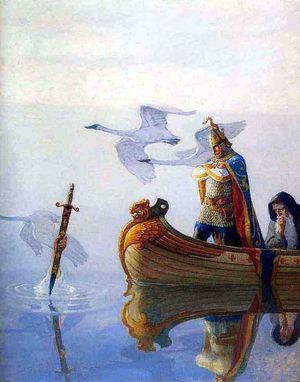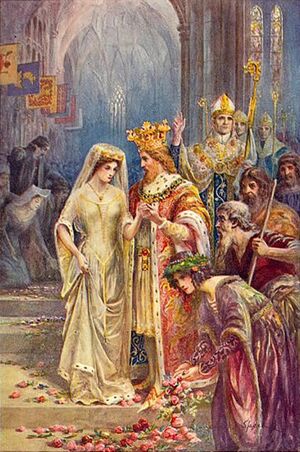Король Артур

The “once and future king,” fifth- or sixth-century King of the Britons and Guru of the mystery school at Camelot, an embodiment of El Morya. He drove the Saxon invaders from Britain, united the kingdom and established the order of the Knights of the Round Table, whose code of chivalry bound them to defend the helpless from the wicked and evildoers and to uphold the ideals of purity, truth, mercy, faithfulness and generosity.
Arthurian legends
Between the eleventh and fourteenth centuries, Arthurian legends attained the height of their popularity. Minstrels and troubadours carried the fame of Arthur all over Europe. Historians told of his valiant deeds in prose, and poets in verse, while artists adorned the halls, tapestries and stained-glass windows of many castles with scenes depicting the adventures of King Arthur and the knights and ladies of the Round Table.
The story of Arthur as presented in Sir Thomas Malory’s Morte d’Arthur is considered a masterpiece. Malory wrote his great work from behind bars during the Wars of the Roses (1455–86). This single book revived a vivid interest in the life of Arthur, his noble deeds, and those of his knights.
Coincidentally, in the year Malory’s book was published, Henry VII, the new king of England, announced that he himself was a descendant of King Arthur. He stated that his son, whom he named Arthur, was the fulfillment of Merlin’s prophecy—Arthur had returned to rule England.
The next great revival of interest in Arthur and his court of Camelot came as a result of the publication of the Idylls of the King by Alfred Lord Tennyson in 1842. The work was so popular throughout all the English-speaking world, that by 1890 it was taught in all public schools in the United States.
The historical King Arthur
The historical King Arthur is said to have lived about 500 A.D., and is thought to have been a leader of the Britons in their battles against the invading Anglo-Saxon kings. Malory and Tennyson both record that he fought and defeated twelve kings. Arthur was so wise a leader and performed so many deeds of valor that he became a hero to his countrymen for all time.
Some historical evidence of Arthur’s life comes from Glastonbury Abbey. Some of the priests who served there during the sixth century preserved a record of their receipt of the disinterred bodies of both King Arthur and his queen, Guinevere. The bodies of the royal couple were buried beneath the high altar in the church.
According to an account by Giraldus Cambrensis, who was present when the grave was opened at the command of Henry II about the year 1150, the grave contained the bones and sword of King Arthur. It also contained a leaden cross which contained the following inscription: Here lies buried the famous King Arthur, in the island of Avalon.
Рождение Артура
According to Malory, Arthur was born to Uther Pendragon, “king of all England,” and noble Queen Igraine at Merlin’s own bidding with the understanding that the child would be delivered to Merlin as soon as he was born. And so the tiny newborn babe bound in a cloth of gold was brought to the “poor man” at the postern gate of the castle and taken to Sir Ector, whose wife nourished him at her own breast. Merlin called a holy man to christen him and named the child Arthur.
Within two years, while King Uther lay mortally ill, his enemies “did a great battle upon his men and slew many of his people.” Merlin bade the king to ride into the battlefield on a stretcher, for “if your person be there ... then shall ye have the victory.” So it was at St. Albans that Uther’s men overcame the “great host of the North.”
The dying king returned to London, where Merlin called together all the barons of Uther’s realm in order that the king might name his heir. And Merlin said aloud, “‘Shall your son Arthur be king after your days?’” And Uther answered, “‘I give him God’s blessing and mine’ ... wherewith he yielded up the ghost.”

Меч в камне
The land of England stood then “in jeopardy a long while,” for many rose up attempting to capture the crown by force. So Merlin went before the Archbishop of Canterbury and counseled him to call all the lords of the realm to London at Christmas in order that Jesus, born King of Kings, might come to show who should rule England.
By the alchemy of the Christ consciousness, Merlin caused the sword and the stone to appear in the churchyard of Canterbury cathedral with these words: “Whosoever pulleth out this sword of this stone and anvil, is rightwise king born of all England.” By the trial of the sword—representing the power of the soul that is free from the bondage of attachment to things material symbolized by the stone and anvil—Arthur proved his kingship.
Испытание мечом выявляет мощь души, свободной от рабской привязанности к материальным вещам, символом которых являются камень и наковальня. Это свидетельство божественного права царей - лишь обладающий наибольшими достижениями в Христосознании достоин править. Со всего западного мира собрались рыцари и воины, короли и знать, но лишь Артур - мальчик двенадцати лет смог освободить священный меч. Епископ Кентерберийский короновал его королем Англии.
Thereafter, Merlin remained at Arthur’s side as counselor and friend. The young king once would have died by the sword of mighty Pellinore had not Merlin appeared and “cast an enchantment” upon the knight. It was because Arthur’s sword was smitten in two during that fierce joust that Merlin and Arthur rode to the lake where they miraculously beheld rising from the water the arm of the Lady of the Lake holding the magnificent sword Excalibur. Merlin later counseled him, “Look ye keep well the scabbard of Excalibur for ye shall lose no blood while ye have the scabbard upon you”—a prediction well fulfilled in future years.
It was Merlin who went before King Leodegrance to announce the desire of Arthur to wed his daughter Guinevere. He returned triumphantly to Camelot with Lady Guinevere and the Round Table, a gift to Leodegrance from Arthur’s father, Uther Pendragon.

Камелот
Со всего королевства король Артур созвал в Камелот мужчин и женщин, наделенных высочайшими достоинствами, и создал орден Рыцарей Круглого Стола. Смысл их жизни, их raison d’être[1]: поиск Святого Грааля, защита Материнского принципа, вечное братство под Вечным Отцом, восстановление царства Христа на Земле, защита пламени Святого Духа в общине двора короля Артура и распространение его по всей Британии, облагораживание души преданным служением Христу в индивидуализированной общинной деятельности.
Рыцари Круглого Стола и придворные дамы Камелота были посвященными тайной школы Великого Белого Братства. Продолжая традицию Пифагорейской школы в Кротоне, Ессейской общины в Кумране, мандалы Христа и его апостолов, а также пришедших им на смену цехов средневековой Европы, рыцари и дамы оберегали сокровенные истины Братства, открываемые им Сен-Жерменом, который был воплощен всеми любимым Мерлином - придворным магом и советником короля. Рыцарские турниры и поединки были способом выявления уровня внутренних достижений их душ.
Глубокая любовь и преданность короля Артура и королевы Гвиневир, проявленная во взаимоотношениях их душ в роли гуру и чела, была фокусом пламени Бога Отца-Матери в центре Камелота. Приход в орден Рыцарей Круглого Стола Ланселота дю Лака, также чела Артура, стал соединением трех лиц Троицы, тройного пламени в сердце Камелота. Родство же душ Ланселота и Гвиневир было родством близнецовых пламен. Вместе Артур, Гвиневир и Ланселот заложили основание христианской - эпохи Рыб - диспенсации для англо-говорящих народов.
Артур водил своих рыцарей на поиски Святого Грааля - чаши, из которой Иисус пил на Тайной Вечере. После его вознесения чаша Грааля была опущена в колодец в Гластонбери группой учеников, которые вместе с Матерью Марией и Иосифом Аримафейским совершили путешествие на судне из Святой Земли, чтобы установить святыни на Европейском континенте и Британских островах для распространения западного христианства во время последующего двухтысячелетнего цикла.
Таким образом, Эль Мория, помазанник Божий (помазанный Мерлином, воплощением пророка Самуила, помазывателя царей и пророков народу Израилеву), своим настроем на фокус Грааля и устремлением к нему, благородными идеалами и духовным гением, создал платформу для разбрасывания семян света Христа по всему земному шару, куда бы, под воздействием его импульса, ни вступали британцы для открытия и заселения новых земель. Внутренний смысл рыцарских посвящений братства искателей заключался в обретении Христосознания через закон самодисциплинированного служения жизни.

Arthur’s passing
Среди рыцарей Круглого Стола был сэр Маурид (утверждавший, что он - внебрачный сын Артура), который питал сильную ревность и ненависть к королю. Зная, что в бою Артур непобедим, он связался с колдуньей по имени Моргана ле Фей, и, объединившись, они использовали изощренные уловки колдовства, коварство и интриги, чтобы разрушить священное доверие между королем, королевой и рыцарями Круглого Стола. В войне, возникшей вследствие отказа подчиниться требованию Рима платить дань, Артур покорил бы сам Рим и всю империю, если бы его не отозвали обратно в Англию, где Маурид узурпировал трон и заточил королеву Гвиневир в лондонский Тауэр. В последовавшем ожесточенном Камламском сражении Артур сразил Маурида, но сам был смертельно ранен.
According to Arthurian legends, he was placed on a barge with three queens which drifted toward Avalon, an “island valley,” where, as Alfred Lord Tennyson wrote in Idylls of the King, “falls not hail, or rain, or any snow, nor ever wind blows loudly; but it lies deep-meadow’d, happy, fair with orchard lawns and bowery hollows crown’d with summer sea.” Some accounts say that Arthur would be healed of his “grievous wound” at Avalon and would return to rule over his people.
Sir Thomas Malory writes in Le Morte d’Arthur:
Yet some men say in many parts of England that King Arthur is not dead, but had by the will of Our Lord Jesu [withdrawn] into another place; and men say that he shall come again, and he shall win the holy cross. I will not say that it shall be so, but rather I will say, here in this world he changed his life. But many men say that there is written upon his tomb this verse: Hic iacet Arthurus, rex quondam rexque futurus [Here lies Arthur, the once and future king].
The return of Arthur
Many Englishmen believed that Arthur never died. He was for them a sort of guardian angel, watching over his people from his home on the Isle of Avalon. In times of acute crisis, they believed Arthur would return to lead England to victory.
We also believe that the saint who became Thomas Becket and Thomas More was the reincarnated soul of Arthur, and that he, now ascended, is our own Guru and teacher who shows us the way of the will of God according to the path of Christ.
The Heart of the Inner Retreat is as “Avalon” where chelas of El Morya retreat in summer to be healed of the blows of karmic adversity affecting body, mind and soul. And the master himself takes refuge in this Western Shamballa—Gautama Buddha’s etheric/physical retreat in the West, an extension of his retreat over the Gobi Desert, which is centered over “the Heart” of this island valley.
См. также
Источники
Эль Мория, Чела и Путь: Ключи к духовному совершенствованию в эпоху Водолея.
Жемчужины мудрости, том 31, номер 34, 2 июня 1988
Жемчужины мудрости, том 28, номер 51, 22 Декабрь 1985 г.
Элизабет Клэр Профет, 22 мая 1983 г.
Элизабет Клэр Профет, 21 апреля 1984 г.
- ↑ Raison d’être - фр., разумное основание, смысл.
